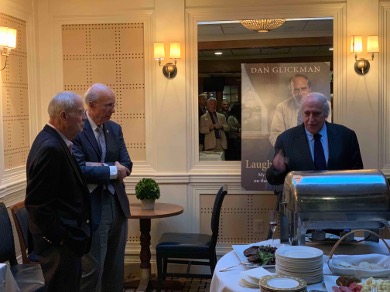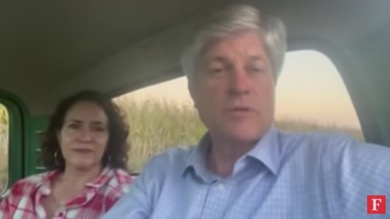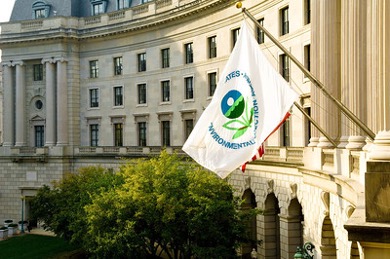A bipartisan group of House members is introducing a bill to create a beef industry contract library that producers could consult in marketing their cattle. The House Agriculture Committee is expected to consider the measure on Thursday.
Rep. Dusty Johnson, R-S.D., introduced the Cattle Contract Library Act along with Rep. Henry Cuellar, D-Texas, and 16 other members. The USDA library would provide producers with key details on cattle contracts, including the type and duration.
The bill is backed by the American Farm Bureau Federation, National Cattlemen’s Beef Association, U.S. Cattlemen’s Association, National Farmers Union and the Livestock Marketing Association.

Former Ag Secretary Dan Glickman recounts some tales from his new book, “Laughing at Myself,” at The Monocle restaurant on Capitol Hill Tuesday evening. Looking on, from left, are former Ag Secretary John Block and former Sen. Pat Roberts, R-Kan.
FAO official: Biotech can help address climate
A top official with the Food and Agriculture Organization of the United Nations says gene editing could help countries address climate change and suggests the technology also could help address consumer concerns.
FAO is “especially excited about the next generation of gene editing technologies that can be used, I think, very importantly in ways to improve plant and animal populations,” said Beth Bechdol, an American who is FAO’s deputy director-general. She was speaking on a webinar that the State Department held in conjunction with the World Food Prize Foundation’s annual conference in Des Moines.
She went on, “We can't have a discussion about addressing the climate crisis without focusing on both mitigation, and also adaptation. And in both of these areas, agroecology and also biotechnology practices have very important roles to play,” she said. (Agroecology applies ecological principles to farming practices.)
She suggested the use of gene editing also could help address the “consumer and governmental and public policy-related concerns that continue to circle the topic of genetic modification and genetic engineering.”
Keep in mind: The Biden administration will be using the upcoming climate conference in Glasgow, Scotland, to launch a multi-nation coalition to promote the use of technology in agriculture.
By the way: Bechdol, who was raised on a family farm in Indiana, has a master’s degree in ag economics from Purdue University.

Nebraska Rep. Jeff Fortenberry
Ag appropriator indicted
The top Republican on the House Agriculture Appropriations Subcommittee, Nebraska Rep. Jeff Fortenberry, has been indicted on charges that he repeatedly lied to authorities during an investigation of illegal campaign contributions.
Before the charges were announced, Fortenberry posted a video (shown above) in which he denied the allegations. The three felony charges each carry a maximum sentence of five years in prison.
Grassley urges Vilsack to press Mexican ag chief on GMOs
Agriculture Secretary Tom Vilsack will be spending a lot of time this week with his Mexican counterpart Víctor Villalobos, and Sen. Chuck Grassley, R-Iowa, hopes Vilsack will use the time to press Villalobos on his country’s anti-biotech stance.
Mexico has not approved a new ag biotech trait since May of 2018, creating a bottleneck that is now blocking 23 traits in apples, canola, corn, soybeans and potatoes. Mexico also published a decree stating that the country will outlaw the use of genetically modified corn for human consumption.
Vilsack will be hosting Villalobos today and tomorrow for meetings in Iowa as the two attend the World Food Prize gathering.
Mexico starts first TRQ for soybean imports
Mexico has erected a three-month quota to allow in as much as 500,000 metric tons of soybeans tariff-free from countries like Brazil and Argentina that normally face a 15% duty, according to a new report from USDA’s Foreign Agricultural Service. The tariff rate quota went into effect Oct. 1 and expires Dec. 31.
The U.S. is the number-one foreign supplier of soybeans to Mexico and trade is tariff-free year-round thanks to the North American Free Trade Agreement. Mexican oil makers have been urging the government for a TRQ because of tight supplies, but the mechanism may not be used at all because of the timing, according to the FAS report. The U.S. is in its harvest season while Brazil won’t be harvesting the bulk of its next crop until after the TRQ expires.
Nevertheless, it is the first-ever Mexican TRQ for soybeans, and now the mechanism is ready for future needs, says FAS.
‘Next gen’ fertilizers win awards from USDA, EPA
USDA and EPA have announced awards for “next gen” fertilizers that include “a range of solutions that can improve environmental outcomes, including reduced nitrous oxide emissions — the largest source of greenhouse gas emissions from agriculture — while maintaining or increasing crop yields,” the agencies said.
One of the winners is “Smart-N,” which “releases nutrients on-demand by the crop and which creates a chemical ‘cage’ for urea that dissolves into plant nutrients.” Another winner, Bio 800+, is a “microbial inoculant that harnesses the power of over 800 species of soil microbes, kelp, and other soil-amending ingredients to promote greater crop production and plant health.”
EPA to look at neonics’ effects on endangered species
The Environmental Protection Agency has agreed to examine the effects of two neonicotinoids on endangered species and critical habitat.
By October 2024, EPA will complete “effects determinations” for acetamiprid and dinotefuran, it said in a proposed partial settlement agreement with the Natural Resources Defense Council.
The agency already agreed earlier in the subject litigation to review the effects of imidacloprid on listed species by June 30, 2022. If the effects determinations warrant interagency consultation with federal wildlife agencies, EPA said it would conduct that afterward.
EPA has asked for comments for 30 days on the proposed agreement, according to today’s Federal Register.
She said it. “I think there's probably a permanent parking spot for Joe Manchin on the White House grounds.” – Sen. Debbie Stabenow, D-Mich., telling reporters that she thinks President Biden has been consistently engaged with senators in negotiations around the Build Back Better plan.
Questions? Tips? Comments? Email Philip Brasher at philip@agri-pulse.com





